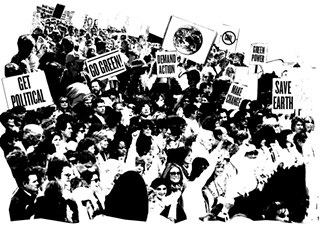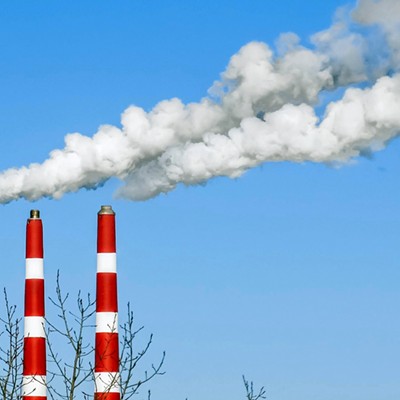"What are you doing to be more environmentally conscious?"
That was the question for the day on CBC Radio's Maritime Noon last week. The next day the CBC aired Ian Hanomansing's new show, Feeling the Heat, which is devoted to helping people find "ways to balance practical and environmental concerns in their everyday lives."
You see a trend here? The shows are telling us that concern for the environment is a personal issue, a lifestyle choice. If we just drive the right car or the take the bus, screw in the right light bulbs, become experts in sorting garbage, we'll achieve eco-bliss. It's up to you and me, individually.
Well, no.
Don't get me wrong: I don't want to discourage people from learning how to live with a lighter enviro-footprint. Far from it. And I'm continually trying to do the right thing in my own life—retrofit the house, grow a garden and so forth. Good on the CBC for helping us learn how.
But all our individual efforts won't amount to squat if they aren't accompanied by major—radical, even—political action.
As I've pointed out before, if we are to avoid cataclysmic climate change, we in Canada need to cut our greenhouse gas emissions by 85 percent. In Nova Scotia, however, almost half of our collective GHG emissions come from four coal-fired power plants. Do the math: You can walk everywhere, use a composting toilet, eat only dandelions from your yard, whatever. It won't matter. If those four plants keep operating, we simply cannot avoid the worst effects of global warming.
As for the nation as a whole, on the one hand we can have 33 million people individually bringing cloth bags to the grocery store and making sure their car tires are properly inflated. On the other hand, we can mine the tar sands, which hold enough stored GHG that, if released, will make it impossible for Canada to meet even the weak emission targets of the Kyoto Protocol, and much less the targets necessary to actually head off global warming.
It's as simple as that: Canada either mines the tar sands or successfully minimizes the effects of climate change. If we keep mining the tar sands it won't matter how many microwave clocks are unplugged.
Yes, yes, I can anticipate the letters of outcry already: We need to do both! We need to do the political things and we need to incorporate the environmental ethic into our personal lives!
And I agree. The problem is, the "do the political thing" is often, almost always, left out of the equation.
Google "things you can do to help the environment" and you'll come up with around 9,000 lists of various suggestions. From my cursory read, hardly any of the lists even mention getting involved politically and the few that do tend to put it near the bottom, at 53 out of 55, or whatever.
But political action should be number one—at the top of every list compiled for those concerned about the environment. We should do all the other stuff, certainly, yet do it not as atomized individuals but rather as part of an active, participatory citizenry.
If you have the money to buy a hybrid car, then you've got the money to support candidates who will move Canada away from a tar-sands economy. If you have the time to travel on our under-funded bus system, then you've got the time to call your MLA and demand action over the coal plants. If you have the smarts to figure out the calculus of recycling, then you've got the smarts to organize your neighbours politically.
That's what you can do for the environment.
Write. It’s what you can do for us. Email [email protected].












